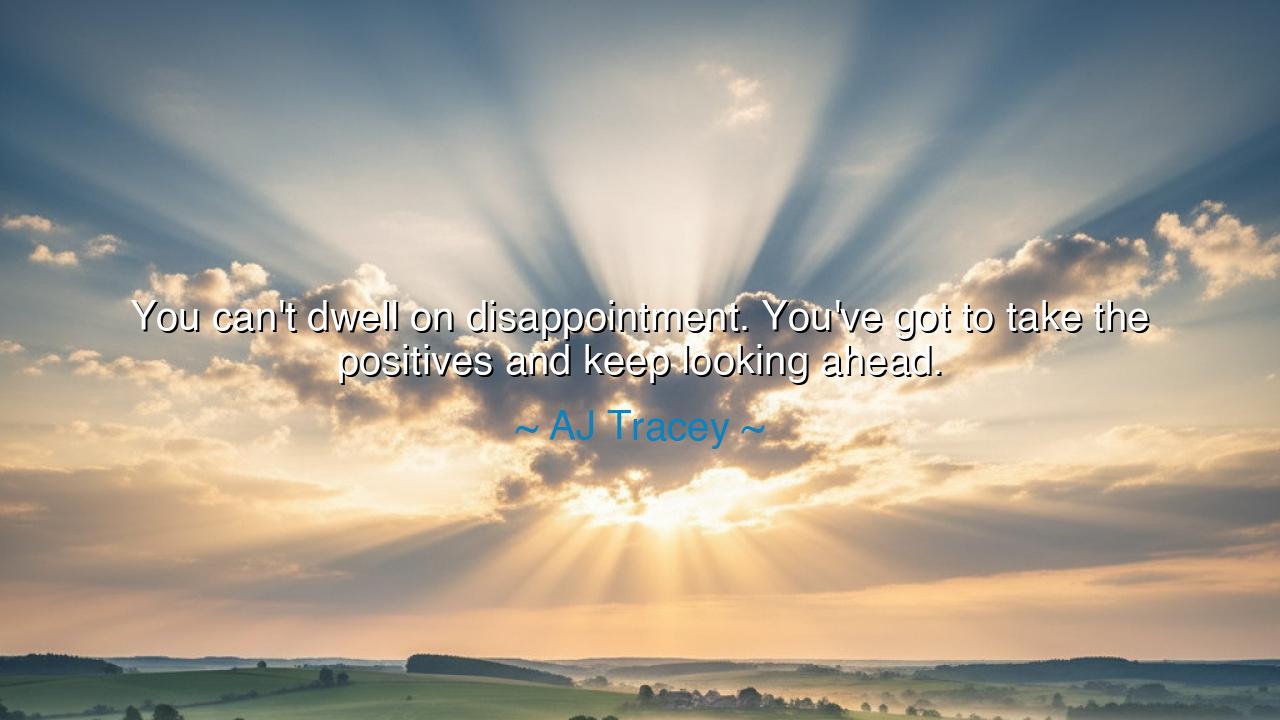
You can't dwell on disappointment. You've got to take the
You can't dwell on disappointment. You've got to take the positives and keep looking ahead.






Hear the words of AJ Tracey, who speaks with the rhythm of the streets yet carries the wisdom of the ages: “You can’t dwell on disappointment. You’ve got to take the positives and keep looking ahead.” These words are a beacon to those who stumble, to those whose hopes have been dashed by failure or betrayal. For the human heart, left unchecked, clings to sorrow, turning it over again and again until it becomes a prison. But Tracey reminds us that the way of strength is not to sit in ashes, but to rise, to gather what is good, and to fix the eyes on the horizon.
To dwell on disappointment is to chain the soul to what has already passed. It is to give yesterday the power to poison today and tomorrow. Disappointments are inevitable—losses in battle, failures in work, betrayals in love. Yet to dwell on them endlessly is to allow them to rule over us. The wise know that every stumble, though bitter, carries within it a lesson, and that this lesson is the treasure we must carry forward. The rest—the pain, the regret—must be left behind, lest it consume us.
The ancients understood this truth. In the Iliad, Hector falls not because he was weak, but because fate had chosen his end. Yet his name is remembered because he stood firm to the last, never bowing to despair. In the East, the samurai creed taught that defeat could not dishonor a man if he used it to refine his spirit. Across all cultures, the teaching repeats: disappointment is not the final word, unless you choose to dwell upon it. The path of the hero is to take what is learned and keep pressing ahead.
History gives us shining testimony. Consider Abraham Lincoln, who lost elections, faced ridicule, and endured crushing setbacks. Many would have surrendered to despair, dwelling endlessly on each failure. Yet Lincoln chose to hold fast to the positives—his growing wisdom, his strengthening character, the lessons of each defeat. By refusing to be broken, he moved forward until he became one of the greatest leaders of his time, guiding a nation through its darkest trial. His life echoes Tracey’s wisdom: success is not born of avoiding disappointment, but of refusing to dwell on it.
Yet this teaching is more than survival—it is a call to growth. When you take the positives, you transform disappointment into power. A failed venture may sharpen your strategy, a broken friendship may teach you discernment, a missed opportunity may prepare you for a greater one. This alchemy—turning sorrow into wisdom—is the essence of resilience. By looking ahead, the heart chooses hope over despair, light over darkness, life over death.
The lesson for us is clear: disappointment is part of every journey, but it must never be the destination. To linger upon it is to lose precious time and energy. To extract the positives and move forward is to remain alive to possibility, to walk the path of growth and victory. The one who looks ahead finds new horizons, while the one who looks backward is trapped in endless shadows.
Practical steps flow from this wisdom. When disappointment strikes, pause and grieve if you must, but do not stay there long. Ask yourself: What lesson lies within this? What strength can I carry forward? Write down the positives, however small, and let them remind you of progress. Set your eyes upon the next step, however modest, and take it with courage. Surround yourself with those who encourage forward motion, not those who dwell forever in regret.
So remember AJ Tracey’s counsel: “You can’t dwell on disappointment. Take the positives and keep looking ahead.” Let this be a shield in times of failure and a compass in times of confusion. For the way of the strong is not to deny pain, but to master it, to transform it, and to press on toward the future. In this way, you will not only endure—you will triumph, leaving behind a legacy of hope for all who follow after you.






LNLam Nguyen
I appreciate the encouragement to look ahead, but it prompts me to ask: what role does support from others play in overcoming disappointment? Can positivity and forward-looking strategies be effective in isolation, or is guidance and encouragement from friends, mentors, or community essential? I’d like to explore how external and internal resources combine to help individuals navigate setbacks successfully.
PLNGO THI PHUONG LINH
This perspective emphasizes progress, but it makes me curious about the psychological process behind it. How do people train themselves to shift from dwelling on disappointment to identifying positives? Are some personalities more naturally equipped for this mindset, or can it be developed through practice? Exploring this could help understand resilience and motivation more deeply.
VPVũ Vĩnh Phúc
Reading this, I feel motivated, yet I wonder if constantly focusing on the positives might lead to ignoring lessons from mistakes. How can one ensure that moving forward doesn’t mean repeating past errors? I’d like to discuss practical approaches for acknowledging disappointments fully while still maintaining forward momentum and optimism.
UGUser Google
This quote resonates, but it raises the question of how one balances processing disappointment with moving forward. Is it possible to extract positives without minimizing feelings of hurt or failure? I’d like to explore strategies for reframing setbacks constructively, so that looking ahead becomes empowering rather than dismissive of valid emotions. How can people build resilience while still honoring their experiences?